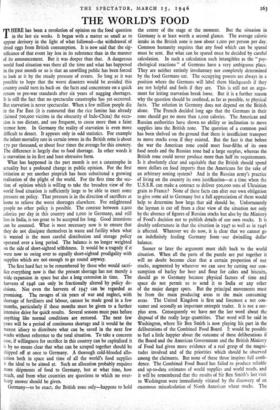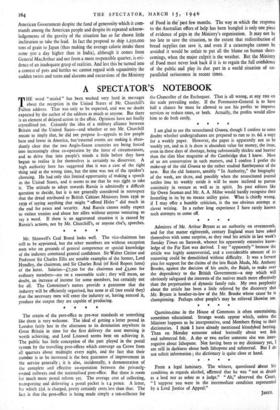THE WORLD'S FOOD
THERE has been a revolution of opinion on the food question in the last six weeks. It began with a matter so small as to appear derisory in the light of what followed—the withdrawal of dried eggs from British consumption. It is now said that the sig- nificance of that event lay less in its substance than in the manner of its announcement. But it was deeper than that. A dangerous world food situation was there all the time and what has happened in the past month or so is that an unwilling public has been forced to look at it by the steady pressure of events. So long as it was possible to hope that the worst disasters would be avoided this country could turn its back on the facts and concentrate on a quick return to pre-war standards after six years of nagging shortages. It is still the fact that no spectacular catastrophe has yet occurred. But starvation is never spectacular. When a few million people die in the Far East (it is rumoured that the rice famine has already claimed 7oo,000 victims in the obscurity of Indo-China) the occa- sion is too distant, and too frequent, to cause more than a faint tremor here. In Germany the reality of starvation is even more difficult to detect. It appears only in odd statistics. For example the infant mortality rate in certain towns in the British zohe is about 17o per thousand, or about four times the average for this country. The difference is largely due to food shortage. In other words it is starvation in its first and least obtrusive form.
What has happened in the past month is not a catastrophe in actuality but a profound change in public opinion. For the first irritation at yet another pinprick has been substituted a growing realisation of the plight of the world. For the first time the sec- tion of opinion which is willing to take the broadest view of the world food situation is sufficiently large to be able to exert some pressure on policy. That pressure is in the direction of sacrifices at home to relieve the worst shortages elsewhere. For enlightened people no other policy is possible. The contrast between 2,90o calories per day in this country and 1,000 in Germany, and still less in India, is too great to be accepted for long. Good intentions can be assumed. What is most necessary now is to ensure that they do not dissipate themselves in waste and futility when what is wanted is the most careful distribution and storage policy operated over a long period. The balance is no longer weighted on the side of short-sighted selfishness. It would be a tragedy if it were now to swing over to equally short-sighted prodigality with supplies which are not enough to go round anyway.
The first hard fact to be remembered by those who would sacri- fice everything now is that the present shortage has not merely a wide expansion in space but also a long extension in time. The harvests of 1946 can only be fractionally altered by policy de- cisions. Not even the harvests of 1947 can be regarded as promising. The ravages of six years of war and neglect, with shortage of fertilisers and labour, cannot be made good in a few months, particularly if these months must be given to a further intensive drive for quick results. Several seasons must pass before anything like normal conditions are restored. The next few years will be a period of continuous shortage and it would be the merest idiocy to distribute what can be saved in the next few weeks without reference to the total situation. To take a concrete case, if willingness for sacrifice in this country can be capitalised it is by no means clear that what can be scraped together should be shipped off at once to Germany. A thorough cold-blooded allo- cation both in space and time of all the world's food supplies is the ideal to be aimed at. Such an allocation probably requires more shipments of food to Germany, but at what time, how much, and from what countries are questions to which no over- hasty answer should be given.
Germany—to be exact, the British zone only—happens to hold the centre of the stage at the moment. But the situation in Germany is at least worth a second glance. The average calorie intake in the British zone is now about i,000 per person per day. Common humanity requires that any food which can be spared must be sent. But what can be spared must be decided by careful calculation. In such a calculation such intangibles as the " psy- chological reactions " of Germans have a very ambiguous place. They are neither entirely involuntary nor completely determined by the food Germans eat. The occupying powers are always in a position where the Germans will label them blackguards if they are not helpful and fools if they are. This is still not an argu- ment for letting starvation break loose. But it is a further reason why the question should be confined, as far as possible, to physical facts. The solution in Germany does not depend on the British alone. The French decided long ago that the Germans in their zone should get no more than t,000 calories. The American and Russian authorities have shown no ability or inclination to move supplies into the British zone. The question of a common pool has been shelved on the ground that there is insufficient transport to move stocks even if they existed. But the fact is that before the war the American zone could meet four-fifths of its own food needs and the Russian zone had a large surplus, whereas the British zone could never produce more than half its requirements. Is it absolutely clear and equitable that the British should spend more dollars on food imports than the Americans for the sake of an arbitrary zoning system? And is the Russian army's practice of living on the country its own justification—at a time when the U.S.S.R. can make a contract to deliver 500,000 tons of Ukrainian grain to France? None of these facts can alter our own obligation to give some aid to Germany but a full appreciation of them would help to determine how large that aid should be. Unfortunately the layman is cut off from a clear view of the situation not only by the absence of figures of Russian stocks but also by the Ministry of Food's decision not to publish details of our own stocks. It is doubly unfortunate in that the situation in 1947 as well as in 1946 is affected. Whatever we do now, it is clear that we cannot go on indefinitely feeding Germany from • our dwindling dollar balance.
Sooner or later the argument must shift back to the world situation. When all the parts of the puzzle are put together it will no doubt become clear that a certain proportion of our stocks, augmented by whatever we can save by cutting our con- sumption of barley for beer and flour for cakes and biscuits, should go to Germany because physical factors of time and space do not permit us to send it to India or any other of the major danger spots. But the principal movements must be from the main producing areas to the main consuming areas. The United Kingdom is first and foremost a net con- sumer and secondly an important entre* trader. It is not a sur- plus area. Consequently we have not the last word about the disposal of the really large quantities. That word will be said in Washington, where Sir Ben Smith is now playing his part in the deliberations of the Combined Food Board. I: would be possible to feel a little happier about the outcome of these deliberations if the Board and the American Government and the British Ministry of Food had given more evidence of a real grasp of the magni- tudes involved and of the priorities which should be observed among the claimants. But none of these three inspires full confi- dence. The Combined Food Board has failed to produce reliable and up-to-date estimates of world supplies and world needs, and it will be remembered that the results of Sir Ben Smith's last visit to Washington were immediately vitiated by the discovery of an enormous miscalculation of North American wheat stocks. The American Government despite the fund of generosity which it com- mands among the American people and despite its repeated acknow- ledgements of the gravity of the situation has so far shown little inclination to take the lead. In fact the proposal to ship 1,250,000 tons of grain to Japan (thus making the average calorie intake there some 500 a day higher than in India), although it comes from General MacArthur and not from a more responsible quarter, is evi- dence of an inadequate grasp of realities. And lest this be turned into a contest of pots and kettles we cannot regard with equanimity the sudden twists and turns and alarums and excursions of the Ministry of Food in the past few months. The way in which the response to the Australian offers of help has been bungled is only one piece of evidence of gips in the Ministry's organisation. It may not be too late to save the situation, to the extent that redistribution of bread supplies can save it, and even if a catastrophe cannot be avoided it would be unfair to put all the blame on human short- comings, when the major culprit is the weather. But the Ministry of Food must never look back if it is to regain the full confidence of the public and play its due part in a world situation of un- paralleled seriousness in recent times.



























 Previous page
Previous page